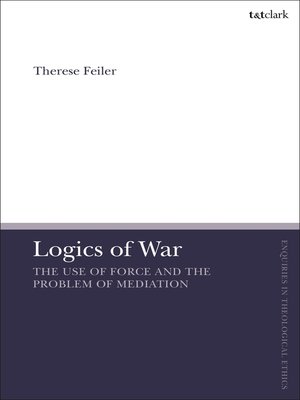Logics of War
ebook ∣ The Use of Force and the Problem of Mediation · T&T Clark Enquiries in Theological Ethics
By Therese Feiler

Sign up to save your library
With an OverDrive account, you can save your favorite libraries for at-a-glance information about availability. Find out more about OverDrive accounts.
Find this title in Libby, the library reading app by OverDrive.



Search for a digital library with this title
Title found at these libraries:
| Library Name | Distance |
|---|---|
| Loading... |
The modern ethics of war is a field of disparate, competing voices based on often unexplored theological and metaphysical assumptions. Therese Feiler approaches them from the borderline area between systematics, philosophical theology and religious studies. With reference to G. W. F. Hegel's and like-minded thinkers' 'theo–logic' that negotiates Christ's mediation and immanent dialectics, Feiler identifies the logic and problem of mediation as the core concern of political ethics.
Feiler unites five representative authors from now disparate strands of contemporary just war ethics, testing whether they offer a meaningful possibility of mediation and subsequent reconciliation: a sovereign realist and a cosmopolitan idealist; a rationalist individualist, an idealist Christian ethicist, and finally, an evangelical theologian. Opening the just war debate for comparative critical engagement, Feiler creates a fascinating study that locates a "dynamic point" at which faithful, free political action can be wrestled from irony, tragedy, and melancholic inertia in the face of totalitarian suffocation.
Feiler unites five representative authors from now disparate strands of contemporary just war ethics, testing whether they offer a meaningful possibility of mediation and subsequent reconciliation: a sovereign realist and a cosmopolitan idealist; a rationalist individualist, an idealist Christian ethicist, and finally, an evangelical theologian. Opening the just war debate for comparative critical engagement, Feiler creates a fascinating study that locates a "dynamic point" at which faithful, free political action can be wrestled from irony, tragedy, and melancholic inertia in the face of totalitarian suffocation.







